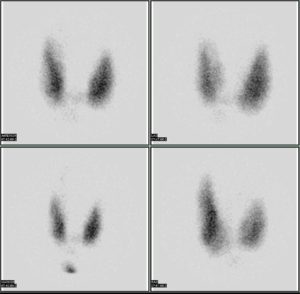
Why have a radioiodine uptake scan (RAI-U)
In a radioiodine uptake scan (abbreviated RAI-U) the patient swallows radioiodine. The thyroid gland absorbs the iodine. A scan then shows how much and where the iodine was absorbed.
Radioiodine uptake tests can help to show what the cause of hyperthyroidism. If the results are diffuse (meaning spread evenly through the whole gland) this shows graves diseases. Other causes such as a thyroid secreting nodule will show iodine concentrated in small areas.
Is a radioiodine uptake scan safe?
In conventional medicine they consider this test safe. They tell patients there are no side effects. Short-term studies show no clear side effects. I could not find any long-term studies. The only source I have found which discusses side effect of RAI-U test is the excellent book from Elaine Moore and Lisa Moore: Advances in Graves Disease and Other Hyperthyroid Disorders
These are the key points made about safety:
- Radiation may take years or decades to manifest as symptoms.
- They have done no long term population studies on those who have had the RAI-U test.
Who should get a radioiodine uptake test?
Whether to have a RAI-U test depends on the specifics of each case. I’m am not against it as it helps to diagnose the cause of hyperthyroidism. I do however believe they should run the test when it needs to be.
When a radioiodine test is recommended patients may consider if it is needed in addition to blood work. At times I have had client’s who reported that RAI-U test was ordered before a full set of thyroid blood tests. Go to this link for for more information on blood tests for hyperthyroidism.
One argument against the test is the fact that Graves disease is the most common cause of hyperthyroidism. So a RAI-U test may not be needed to make a diagnosis. On the hand thyroid secreting nodules and cancer are serious enough that the scan may be needed to rule out. In Graves disease there is an elevation of the TSI (thyroid stimulating immunoglobulin) antibody. However, this marker may also be elevated with other triggers of hyperthyroidism, so it’s not always sufficient to get a correct diagnosis.
Radioiodine uptake test and holistic health